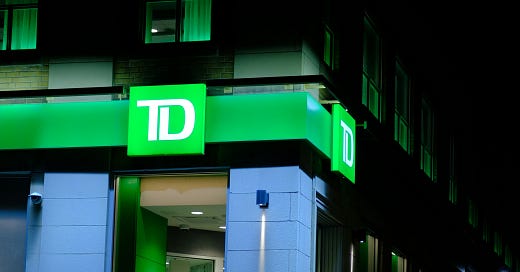Why Did TD Bank Agree to Pay Over $3 Billion In Penalties In the US?
TD Bank has pleaded guilty to criminal charges in the U.S. for allowing the transfer of hundreds of millions of dollars in illicit funds between drug cartels
Context
TD Bank has pleaded guilty to criminal charges in the U.S. for enabling the transfer of illicit funds for over a decade. The bank has agreed to pay over $3 billion in penalties. TD serves over 27.5 million customers around the globe.
Analysis
TD is the first U.S. bank in history to plead guilty to conspiracy to commit money laundering and failing to maintain anti-money-laundering programs.
The Bank operated with inadequate money laundering guards for over a decade, and by 2018, more than 90 percent of transactions were not monitored.
Through this, almost $18 trillion in transactions went unchecked.
This allowed countless schemes to go unnoticed, including a customer depositing $1 million in cash daily. Over a six-year period, over $680 million was laundered through the bank, with some transactions found to be involved in fentanyl drug networks in Mexico and China.
Staff flagged obvious cases of abuse. Despite these internal warnings and repeated concerns through TD internal audits between 2014 and 2022, the anti-money-laundering efforts remained insufficient and stagnant due to underfunding and understaffing.
Some staff have been implicated in these schemes, with one employee accepting more than $57 million in gift cards in bribes. Another issued dozens of ATM cards to money launderers, which resulted in $39 million being laundered.
According to the U.S. Attorney General Merrick B. Garland, the bank chose profits and kept costs down instead of compliance. Now, they are facing billions in criminal and civil penalties as well as non-monetary penalties.
Part of the payment, worth $1.3 billion, will go toward the Treasury’s Financial Crimes Enforcement Network, while $1.8 billion will be directed to the Justice Department.
TD is also facing significant non-monetary restrictions which will have substantial implications for subsidiary operations.
Penalties include new branch and product restrictions, third-party assessments, certified board dividend payments, and, most profoundly, asset caps.
This limits TD’s ability to expand its balance sheet, a key factor in how lenders make money. TD CEO Bharat Masrani announced his retirement within the year and apologized to the stakeholders for these failures.
The share price dropped 7.53 percent when the news broke.




